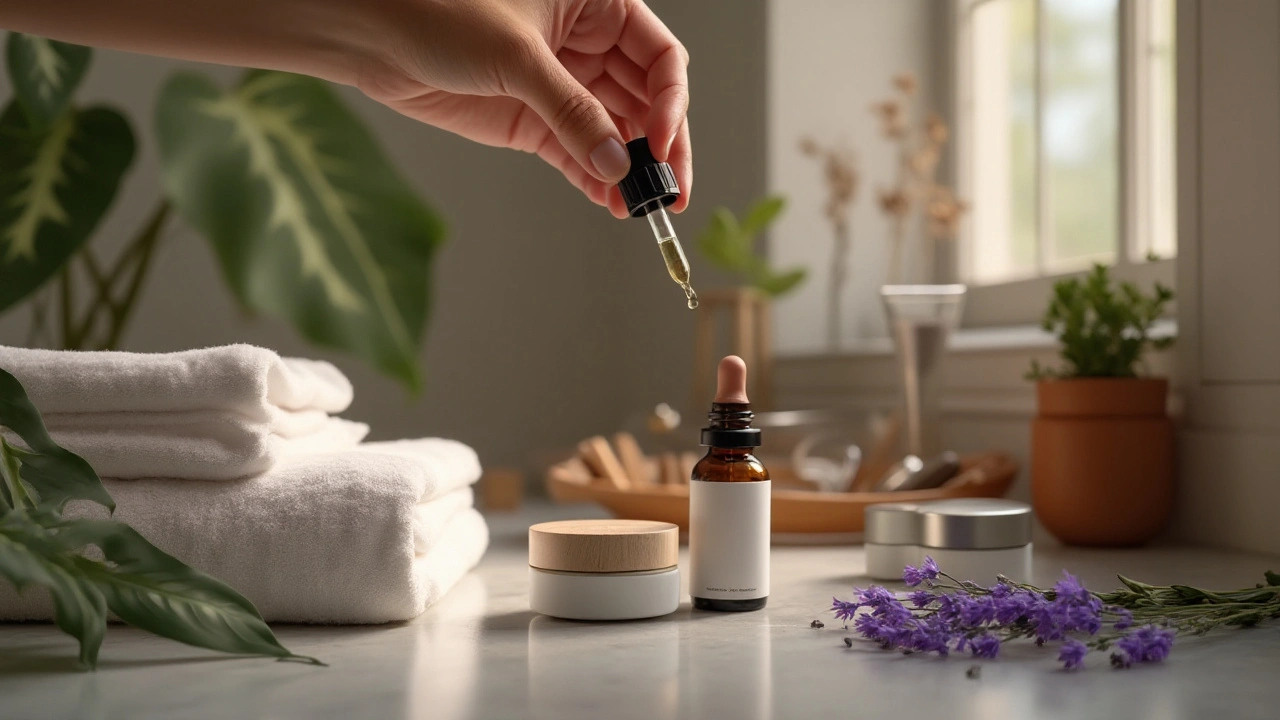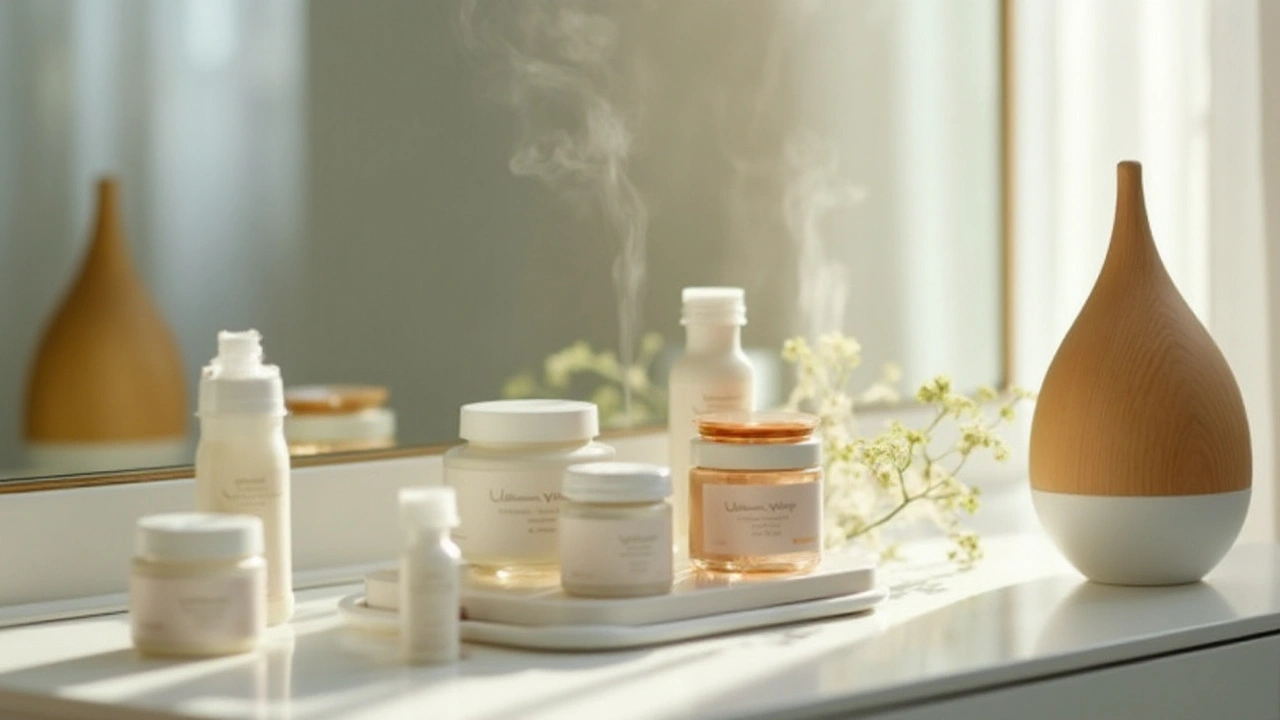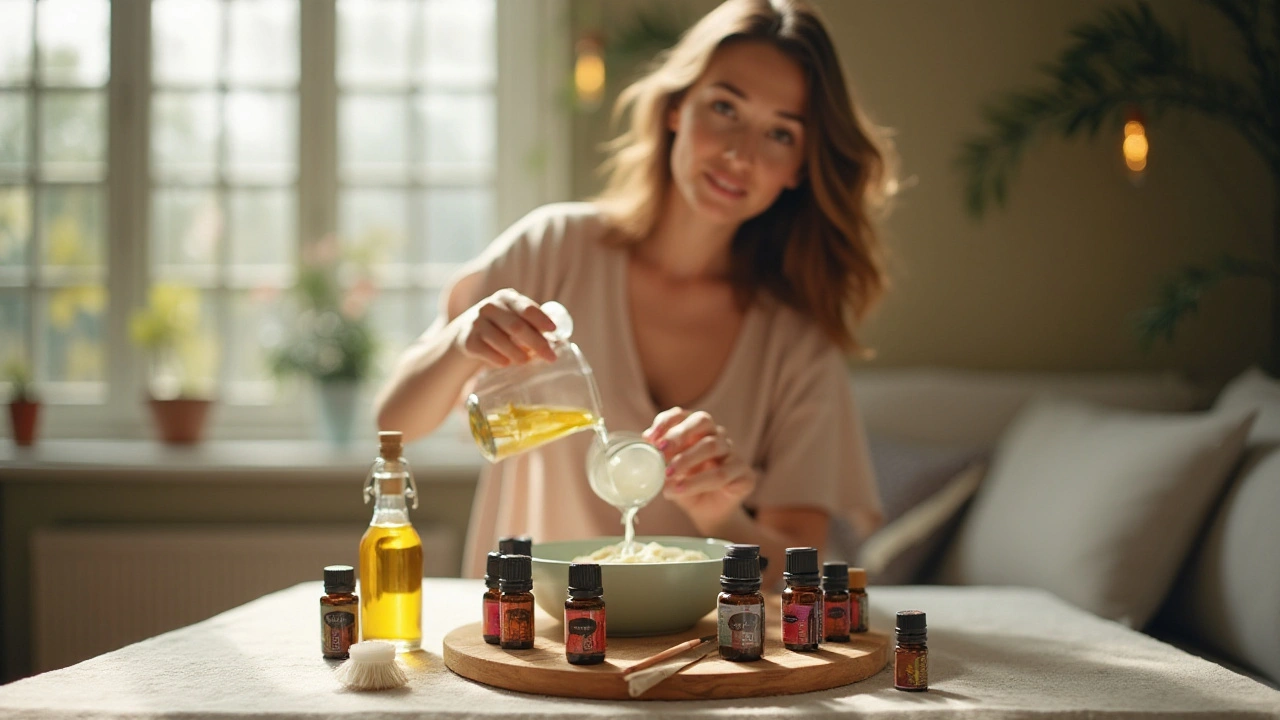
Aromatherapy, the practice of using essential oils derived from plants, has been around for centuries. Traditionally, it's known for its calming and therapeutic effects. But did you know it can also transform your skincare and haircare routines?
In recent years, more people have begun to appreciate the power of aromatherapy in cosmetics. From moisturizers to shampoos, these natural ingredients offer numerous benefits for both skin and hair. They work gently yet effectively, making them an ideal addition to any beauty regimen.
Let's explore how these aromatic wonders can help you achieve healthier, more radiant skin and hair.
- Introduction to Aromatherapy in Cosmetics
- Benefits for Skin
- Benefits for Hair
- Popular Essential Oils and Their Uses
- Practical Tips for Incorporating Aromatherapy
Introduction to Aromatherapy in Cosmetics
Aromatherapy has long been celebrated for its healing and calming effects on the mind and body. Originating from ancient Egypt, this practice involves the extraction of essential oils from plants and their application for therapeutic purposes. Nowadays, its applications extend beyond relaxation and stress relief, finding a prominent place in modern cosmetics.
The integration of aromatherapy into cosmetic products brings a new layer of benefits. Essential oils are packed with natural compounds that have been shown to support skin and hair health. This trend is not just a passing fad; it's backed by science. For instance, essential oils like lavender and peppermint have shown significant antimicrobial and anti-inflammatory properties, which can be especially useful in skincare and haircare routines.
Over the past decade, there has been a noticeable shift towards natural and organic beauty products. Consumers are more informed and increasingly wary of synthetic chemicals found in traditional cosmetics. Aromatherapy offers a natural alternative, infused with the pure essence of plants. It's not just about smelling good; these oils contribute to the overall well-being of your skin and hair.
According to a study published in the Journal of Alternative and Complementary Medicine, lavender oil has been found effective in promoting hair growth. Essential oils like tea tree oil are famous for their ability to combat acne due to their antibacterial properties. These facts highlight the versatility and potency of aromatherapy in enhancing beauty products.
“The use of plant-based oils in cosmetics reflects a growing trend towards sustainability and natural beauty,” says Dr. Jane Smith, a dermatologist specialized in natural skin treatments.
The cosmetic industry's shift towards aromatherapy is not just consumer-driven but also supported by research. Science increasingly validates the health benefits of essential oils, making a strong case for their inclusion in daily beauty routines. Given the rise in demand, many brands now offer an extensive range of aromatherapy-infused beauty products, from moisturizers and serums to shampoos and conditioners.
As consumers, it's crucial to distinguish between high-quality essential oils and synthetic imitations. Always check the labels for the source and extraction method of the essential oil used. Organic, sustainably sourced oils are generally of higher quality and offer the best results. Begin by incorporating one or two products into your routine and observe how your skin and hair respond.
In essence, aromatherapy in cosmetics is about enriching your beauty routine with natural, potent ingredients that support your skin and hair's health. This trend is likely here to stay, promising to offer not just aesthetic benefits but also profound wellness advantages.
Benefits for Skin
When it comes to skincare, the natural potential of aromatherapy in cosmetics is truly remarkable. Essential oils offer a plethora of benefits that can improve your skin's texture, tone, and health. One of the biggest advantages is their ability to deeply moisturize without the greasy feeling that some synthetic ingredients leave behind. For instance, lavender oil is well-known for its calming and hydrating effects on the skin. It promotes relaxation while nourishing your skin, making it an ideal ingredient for night creams.
Another incredible benefit is the anti-inflammatory properties. Essential oils like chamomile and calendula can reduce redness and soothe irritation, ideal for those struggling with sensitive or acne-prone skin. These oils provide relief from itchiness and discomfort, balancing the skin’s natural barrier. This can be particularly useful for conditions like eczema or rosacea where the skin needs extra care and comfort.
Anti-aging is another area where essential oils shine. Frankincense oil, for example, helps reduce fine lines and wrinkles by promoting cell regeneration. This keeps the skin youthful and vibrant. Rosehip oil also deserves special mention for its ability to improve skin elasticity and reduce signs of aging such as dark spots and fine lines. Cleopatra herself was reputed to have used rose oil in her beauty regimen, a testimony to its lasting efficacy.
According to Dr. Jane Buckle, leading expert on clinical aromatherapy, "Essential oils penetrate the skin quickly, influencing the body’s responses at a cellular level and offering benefits that go beyond the surface."Moreover, antimicrobial properties in essential oils like tea tree oil can fight off bacteria, making them great for acne treatment. Tea tree oil is often cited as a natural alternative to harsher chemical treatments, helping to clear up breakouts without drying out the skin.
Your skin's purity is also preserved thanks to the detoxifying properties of essential oils. Lemon oil, for example, can help in removing impurities and toxins from the skin, leaving it clear and radiant. Since it's packed with vitamin C, it also aids in brightening the complexion. This makes lemon oil a popular choice for products aimed at evening skin tone and tackling hyperpigmentation.
Another remarkable benefit includes the antioxidant properties found in many essential oils. Oils like argan and pomegranate are rich in antioxidants, which help to fend off the harmful effects of free radicals. This helps in protecting the skin cells, keeping the skin healthy and glowing. Argan oil, in particular, is effective in providing intense hydration and reducing skin peeling, making it essential in dry climates.
Lastly, therapeutic aromas themselves can have a psychological impact that boosts your overall well-being. Lavender and ylang-ylang, for instance, lend a soothing scent that lifts your mood, reduces stress, and even improves sleep quality. This holistic benefit enhances the beauty treatments, making the skincare process not just an act of self-care but a form of mental wellness too.

Benefits for Hair
Using aromatherapy in your hair care routine can bring numerous benefits. Essential oils, when applied correctly, can nourish the scalp, promote hair growth, and improve the overall texture of your hair. One of the main advantages of essential oils is their ability to balance the production of sebum. Sebum is the natural oil produced by your scalp, and keeping it balanced is crucial for maintaining healthy hair. For instance, tea tree oil is known for its ability to cleanse and clarify the scalp, reducing issues such as dandruff and itchiness.
If you are dealing with hair loss, essential oils can be incredibly beneficial. Studies have shown that certain oils like rosemary oil can stimulate hair follicles, encouraging new growth. Applying a few drops of rosemary oil mixed with a carrier oil to your scalp can increase circulation, which in turn, promotes hair growth. Similarly, lavender oil is known for its soothing properties and can help reduce stress, which is a common cause of hair loss.
Additionally, if you have thin or brittle hair, essential oils can strengthen and add volume. For instance, ylang-ylang oil is excellent for treating dry and damaged hair. It works by stimulating the sebaceous glands to produce more oil, thereby moisturizing and nourishing the hair. Another popular choice is chamomile oil, which not only conditions the hair but also provides a natural shine and softness.
Using aromatherapy in hair care isn’t just about applying oils directly to your scalp. You can also find shampoos and conditioners infused with these beneficial oils. This makes it easier to incorporate into your daily routine. These products often have the added benefit of being free from harsh chemicals that can strip your hair of its natural oils.
Creating your own hair masks at home is another great way to use essential oils. A simple hair mask can be made by mixing coconut oil with a few drops of your favorite essential oil. Apply the mask to your hair and leave it on for at least 30 minutes before rinsing. This treatment can deeply moisturize and restore the health of your hair, especially if used regularly.
When using essential oils, it’s important to remember to dilute them with a carrier oil like jojoba or olive oil to avoid irritation. Essential oils are highly concentrated, and applying them directly to your scalp can cause irritation or burns. Always perform a patch test before using any new oil to ensure you don’t have an allergic reaction.
A 2015 study published in the journal Skin Pharmacology and Physiology found that a blend of essential oils, including thyme, rosemary, lavender, and cedarwood, significantly improved hair growth in participants with alopecia areata.
The aromatherapy benefits for hair are vast and varied. Whether you are looking to improve hair growth, combat dandruff, or simply want shinier, healthier hair, incorporating essential oils into your routine can make a significant difference. So, why not give it a try and experience the natural benefits for yourself?
Popular Essential Oils and Their Uses
Essential oils offer a myriad of benefits when incorporated into your everyday beauty routine. Derived from leaves, flowers, and roots of various plants, these oils are packed with powerful properties that nourish and protect the skin and hair. Here are some popular essential oils to consider.
Lavender Oil
Lavender oil is perhaps one of the most versatile essential oils. It's widely known for its relaxing aroma, but it can do much more than just calm your senses. Lavender oil has antiseptic and anti-inflammatory properties, making it great for treating minor burns, insect bites, and eczema. When used in skincare products, lavender oil can help reduce acne and improve the overall complexion.
For hair care, lavender oil can promote hair growth and treat issues like dandruff and an itchy scalp. Add a few drops to your usual shampoo or create a soothing hair mask by mixing it with a carrier oil like jojoba oil.
Tea Tree Oil
Tea tree oil is renowned for its potent antibacterial and antifungal properties. This makes it incredibly effective against acne. You can find it in acne-fighting cleansers, toners, and spot treatments. The oil can help unclog pores and reduce the severity of breakouts.
When it comes to hair care, tea tree oil can be your best companion for keeping your scalp healthy. It helps in reducing dandruff and clearing up fungal infections on the scalp. You can add a few drops of tea tree oil to your shampoo for an extra cleanse or mix it with a carrier oil for a moisturizing scalp treatment.
Rosehip Oil
Rosehip oil is a natural source of vitamins A and C, plus essential fatty acids. This combination makes it highly effective for reducing the appearance of scars, hyperpigmentation, and fine lines. Applying rosehip oil can lead to smoother, more even-toned skin. Unlike some other oils, rosehip oil is light and absorbs quickly, making it suitable for all skin types.
For hair, rosehip oil provides deep hydration and can help reduce dryness and frizz. By massaging a few drops into your scalp, you can improve blood circulation and promote healthier hair growth.
Peppermint Oil
Peppermint oil is well-known for its fresh, invigorating scent. Its cooling sensation makes it a popular choice for relieving muscle pain and headaches. In skincare, peppermint oil has astringent properties that help balance oily skin and tighten pores.
For your hair, peppermint oil can stimulate the scalp and promote hair growth. It can also help treat dandruff and lice. Add a few drops to your conditioner to enjoy its refreshing benefits.
Chamomile Oil
Chamomile oil is another multi-purpose oil with calming properties. It's beneficial for soothing irritated skin, reducing redness, and calming conditions like eczema and psoriasis. Chamomile oil is gentle enough for sensitive skin, making it a valuable addition to moisturizers and facial oils.
When used in hair care, chamomile oil can improve the overall health and appearance of your hair. It can lighten hair naturally and add a beautiful shine when used consistently.
Essential oils can transform your skincare and hair care routines in more ways than one. With their various benefits, these oils offer a natural and effective way to achieve healthier skin and hair. So next time you're shopping for beauty products or looking to DIY, think of these powerful, aromatic allies.

Practical Tips for Incorporating Aromatherapy
Incorporating aromatherapy into your daily beauty routine doesn't have to be complicated. Here are some practical tips to get you started. These methods are simple yet effective, and they can make your skin and hair care routines more enjoyable and beneficial.
First, when selecting products, look for those that include essential oils as part of their ingredient list. Many brands now create skincare and haircare products that harness the benefits of aromatherapy. Pay attention to labels and opt for items that highlight oils like lavender, tea tree, or rosemary.
Another great way to incorporate essential oils into your regimen is by adding them to your existing products. For instance, add a few drops of lavender oil to your moisturizer for extra hydration and a soothing effect. Your hair conditioner can also benefit from a few drops of rosemary oil, which encourages hair growth and strength.
Aromatherapy can also be introduced through a DIY approach. Create your own face masks or hair treatments using essential oils and natural ingredients. For a nourishing face mask, mix chamomile oil with honey and apply it for 20 minutes. For a hair treatment, blend coconut oil with peppermint oil and let it sit in your hair for about an hour before rinsing.
According to a study from the National Institutes of Health, aromatherapy can reduce anxiety and improve overall skin health by promoting better blood circulation and cell regeneration.
Hydrosols, or floral waters, are another accessible way to enjoy the benefits of aromatherapy. These are by-products of the essential oil distillation process and are less concentrated but still carry wonderful properties. Use rose water as a toner to hydrate and soothe your skin instantly.
Aromatherapy baths are another excellent method. Add a few drops of an essential oil like eucalyptus or lemongrass to your bath for a relaxing and aromatic soak. Or, create bath salts by mixing Epsom salt with your favorite essential oils.
Keep in mind that essential oils are potent and should be used with care. Always perform a patch test before applying them to your skin or hair. Dilute oils properly using a carrier oil like jojoba or almond oil to prevent irritation.
Refreshing your home environment can create a more relaxing atmosphere, which contributes to better skin health. Use an essential oil diffuser to fill your living space with calming scents like lavender or frankincense, which can reduce stress and improve your overall well-being.
With these practical tips, you can effortlessly weave the benefits of aromatherapy into your beauty routine. Not only will you enjoy the pleasant fragrances, but your skin and hair will thank you for the extra care and nourishment.





